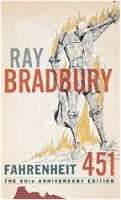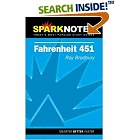
|

 FAHRENHEIT 451 by Ray Bradbury (hier online bestellen)
FAHRENHEIT 451 by Ray Bradbury (hier online bestellen)
The story:
Fahrenheit 451 is a dystopian soft science fiction novel by Ray Bradbury.
Fahrenheit 451 takes place in an unspecified future time, possibly in the 21st or 22nd century, in a
hedonistic and rabidly anti-intellectual America that has completely abandoned self-control and bans the
possession of books. The protagonist, Guy Montag, begins to question his job of burning books when a
strange 17 year old girl named Clarisse McClellan enters his life. She asks him if he is truly happy.
This question starts a series of other questions Montag asks about himself and his life, and remains an
important theme throughout the story. Later, he is visited by his fire Chief (see below) Cpt. Beatty, who
tells him the "reasons" behind his job. After this, he meets Professor Faber, with whom he collaborates
on a small crusade against his job. Montag then kills Beatty after being forced to burn his own apartment
and escapes from the authorities. Then, Montag, having washed off his scent in a local river, floats
downstream and meets a group of homeless persons — mostly older men — who, to Montag's astonishment,
have been expecting him. Every one of them has committed entire books to memory to share with those who
can listen and pass on the stories until books are allowed again. They themselves burned the books they
read to prevent them from being discovered; the true books are safely stored in their minds. Montag
learns from Granger, the leader of the group, about the mythical phoenix that is consumed by fire when
it gets old and complacent, only to be born again through the flames, a symbol of the group's mission
for society.
At this point an international war begins, and Montag watches helplessly as the jets fly over the city
and drop their bombs. His wife, Mildred, is killed in the explosion. It is implied that the bombs are of
a nuclear variety. Montag and the homeless persons return to the city to help rebuild their society in the
manner of the phoenix, so that people might once again learn from the books, and also from the past.
Characters:
Guy Montag is the protagonist and fireman (see above) whose metamorphosis is illustrated throughout the
book and who presents the dystopia through the eyes of a loyal worker to it, a man in conflict about it,
and one resolved to be free of it. Bradbury notes in his afterword that he noticed, after the book was
published, that Montag is the name of a paper company. Guy Montag is also the opposite of "Girl Friday"
(from a movie about newspaper reporters) - 'Montag' meaning 'Monday' in German.
Faber is the former English professor who represents those who know what is being done is wrong, but are
too fearful to act. Bradbury notes in his coda that Faber is part of the name of a German manufacturer of
pencils, Faber-Castell. 'Faber' is also a Latin word meaning 'maker'.
Mildred Montag is Montag's wife, who tries to hide her own emptiness and fear of questioning her
surroundings or herself with meaningless chatter and a constant barrage of television. She constantly
tries to reach the glorified state of happiness, but is inwardly miserable. Mildred even makes an
attempt at suicide early on in the book by overdosing on sleeping pills. She is used symbolically as
the opposite of Clarisse McClellan. She is known as Linda Montag in the 1966 film.
Clarisse McClellan displays every trait Mildred does not. She is outgoing, naturally cheerful, unorthodox,
and intuitive. She serves as the wake-up call for Guy Montag, by posing the question “why?” to him. She is
unpopular among peers, and disliked by teachers for (as she puts it) asking why instead of how, and
focusing on nature rather than technology. Montag always regards her as odd until she goes missing;
the book gives no definitive explanation. But it is said that Captain Beatty and Mildred know that
Clarisse has been killed by a car.
Captain Beatty is Montag's boss and the fire chief. Once an avid reader himself, he is disgusted with
the idea of books and detests how they all contradict and refute each other. In a scene removed by
Bradbury, he invited Guy to his house where he shows him walls of books which he leaves to molder on
their shelves. He tries to entice Guy back into the book-burning business, but is burnt alive by
Montag when he underestimates Montag's resolve. Guy later realizes that Beatty might have wanted to
die and provoked Guy until he did it. He is the symbolic opposite of Granger.
Extracts from book:
It was a pleasure to burn.
It was a special pleasure to see things eaten, to see things blackened and changed. With the brass nozzle
in his fists, with this great python spitting its venomous kerosene upon the world, the blood pounded in
his head, and his hands were the hands of some amazing conductor playing all the symphonies of blazing and
burning to bring down the tatters and charcoal ruins of history. With his symbolic helmet numbered 451
on his stolid head, and his eyes all orange flame with the thought of what came next, he flicked the
igniter and the house jumped up in a gorging fire that burned the evening sky red and yellow and black.
He strode in a swarm of fireflies. He wanted above all, like the old joke, to shove a marshmallow on a
stick in the furnace, while the flapping pigeon-winged books died on the porch and lawn of the house.
While the books went up in sparkling whirls and blew away on a wind turned dark with burning.
About the author:
 Ray Bradbury was born in Waukegan, Illinois to a Swedish immigrant mother and a father who was a power and
telephone lineman.
His paternal grandfather and great-grandfather were newspaper publishers. Bradbury was a reader and writer
throughout his youth, spending much time in the Carnegie Library in Waukegan. His novels Dandelion Wine,
Something Wicked This Way Comes, and Farewell Summer depict the town of Waukegan as "Green Town" and are
semi-autobiographical. The Bradbury family lived in Tucson, Arizona, in 1926–27 and 1932–33, each time
returning to Waukegan, and eventually settled in Los Angeles in 1934, when Ray was thirteen.
Ray Bradbury was born in Waukegan, Illinois to a Swedish immigrant mother and a father who was a power and
telephone lineman.
His paternal grandfather and great-grandfather were newspaper publishers. Bradbury was a reader and writer
throughout his youth, spending much time in the Carnegie Library in Waukegan. His novels Dandelion Wine,
Something Wicked This Way Comes, and Farewell Summer depict the town of Waukegan as "Green Town" and are
semi-autobiographical. The Bradbury family lived in Tucson, Arizona, in 1926–27 and 1932–33, each time
returning to Waukegan, and eventually settled in Los Angeles in 1934, when Ray was thirteen.
Bradbury graduated from Los Angeles High School in 1938 but chose not to attend college. Instead, he
sold newspapers at the corner of South Norton Avenue and Olympic Boulevard. He continued to educate
himself at the local library, and having been influenced by science fiction heroes like Flash Gordon
and Buck Rogers, he began to publish science fiction stories in fanzines in 1938. His first paid piece
was for the pulp magazine Super Science Stories in 1941, for which he earned $15. [2] He became a full-time
writer by the end of 1942. His first book, Dark Carnival, a collection of short works, was published in
1947 by Arkham House. He married Marguerite McClure (1922–2003) in 1947, and they had four daughters.
A chance encounter in a Los Angeles bookstore with the British expatriate writer Christopher Isherwood
gave Bradbury the opportunity to put The Martian Chronicles into the hands of a respected critic.
Isherwood's glowing review followed and was a substantial boost to Bradbury's career.
Buchdaten:
FAHRENHEIT 451 by Ray Bradbury
Sprache: Englisch
Taschenbuch: 208 Seiten
Verlag: Ballantine; Auflage: New ed. (2. Juni 1998)
ISBN: 0345342968
Preis: € 4,97
More works from the same author:
zurück zur Übersicht
|
 FAHRENHEIT 451 by Ray Bradbury (hier online bestellen)
FAHRENHEIT 451 by Ray Bradbury (hier online bestellen)
 Ray Bradbury was born in Waukegan, Illinois to a Swedish immigrant mother and a father who was a power and
telephone lineman.
His paternal grandfather and great-grandfather were newspaper publishers. Bradbury was a reader and writer
throughout his youth, spending much time in the Carnegie Library in Waukegan. His novels Dandelion Wine,
Something Wicked This Way Comes, and Farewell Summer depict the town of Waukegan as "Green Town" and are
semi-autobiographical. The Bradbury family lived in Tucson, Arizona, in 1926–27 and 1932–33, each time
returning to Waukegan, and eventually settled in Los Angeles in 1934, when Ray was thirteen.
Ray Bradbury was born in Waukegan, Illinois to a Swedish immigrant mother and a father who was a power and
telephone lineman.
His paternal grandfather and great-grandfather were newspaper publishers. Bradbury was a reader and writer
throughout his youth, spending much time in the Carnegie Library in Waukegan. His novels Dandelion Wine,
Something Wicked This Way Comes, and Farewell Summer depict the town of Waukegan as "Green Town" and are
semi-autobiographical. The Bradbury family lived in Tucson, Arizona, in 1926–27 and 1932–33, each time
returning to Waukegan, and eventually settled in Los Angeles in 1934, when Ray was thirteen.

